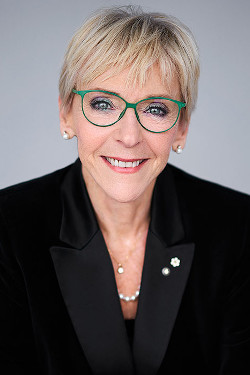Board of Directors
VIA Rail’s Board of Directors is responsible for overseeing the strategic direction and management of the Corporation, and reports on VIA Rail’s operations to the Government of Canada. The Board of Directors, comprised of four women and seven men, possessing a strong mix and balance of skills, knowledge and experience to support the achievement of VIA Rail’s vision and strategic objectives.
-

Françoise Bertrand
Chairperson of the Board
of Directors -

Grant Christoff
Board Member
since March 2019 -

Daniel Gallivan
Board member
since June 2017 -

Jonathan Goldbloom
Board member
since June 2017 -

Miranda Keating Erickson
Board member
since March 2019 -

Glenn Rainbird
Board member
since June 2017 -

Gail Stephens
Board member
since June 2017 -

Kenneth Tan
Board member
since June 2017 -

Catherine Kloepfer
Board member
since May 2024 -

Filipe Dinis
Board member
since May 2024 -

Jonathan Scott
Board Member
since July 2024
Complementary Information
The Board is responsible for the stewardship of VIA Rail Canada Inc. For more information, please consult the Board of Directors Mandate PDF 235 Kb. This link opens in a new tab
The purpose of the evaluation of each Director’s knowledge, skills and experience is to underline the possible “weaknesses” of VIA Rail’s Board of Directors. For more information, please consult the Directors’ Competencies Policy PDF 703 Kb. This link opens in a new tab
The following committees have been established to help the Board perform its duties:
1. Human Resources Committee
The Board of Directors (“Board”) has delegated to the Human Resources Committee the responsibility for oversight and monitoring of the following:
- the performance evaluation and compensation of the President & Chief Executive Officer;
- the performance evaluation and compensation of Executive Officers;
- the design and implementation of employee compensation, incentives, benefits and retirement plans;
- the effectiveness of the organizational structure;
- the design and implementation of management’s development and succession plans;
- the management of employee and labour relations, including negotiation mandates for unionized employees;
- the occupational health & safety framework;
- the DEI and corporate culture initiatives;
- the design and implementation of the human resources strategic plan; and
- the risk identification, evaluation and treatment related to each topic listed above.
2. Stakeholders Engagement & Communications Committee
The Board of Directors (“Board”) has delegated to the Stakeholders Engagement & Communications Committee the responsibility for oversight and monitoring of the following:
- oversee the Corporation’s government relations strategy as well as the Corporation’s internal and external communication in order to generate stakeholder engagement and obtain the social license required to operate and deploy new strategic initiatives;
- oversee the mechanisms in place to consult with key stakeholders and special interest groups to ensure rigor around proofing and social acceptability of the Corporation’s strategic initiatives including the review, among others, of the Corporation’s (i) Indigenous engagement strategy and policy, (ii), Accessibility engagement strategy and policy, and; (iii) Volunteering and donations engagement strategy and policy;
- oversee the mechanisms in place to incorporate stakeholders’ useful feedback in ongoing commercial activities and operations in order to improve decision making and operational efficiencies and ultimately gain support from various stakeholders in new customer experience concepts and initiatives;
- monitor how the Corporation’s brand is perceived in the market and review and assess the Corporation’s plan to protect, support and improve its brand;
- monitor the performance of the commercial and marketing strategies by which new and/or revamped products and/or services will be introduced to key stakeholders and deployed in the market;
- monitor the performance of the commercial and marketing strategies associated with exit strategies for key products and/or services to be modified or abandoned;
- monitor strategic commercial partnerships in order to ensure they align with the Corporation's strategic objectives; and
3. Major Projects / Fleet Modernization Committee
The Board of Directors (“Board”) has delegated to the Major Projects / Fleet Modernization Committee the responsibility for oversight and monitoring of the following:
- the major projects & programs identified as such by the Major Projects / Fleet Modernization Committee, including but not limited to:
- the acquisition and conditioning of the new fleet of trains for the Quebec City – Windsor Corridor in compliance with the procurement and project management processes established by the Corporation (the “Corridor Fleet Replacement Program”) which also includes the upgrading of the VIA Rail Montreal Maintenance Centre and the VIA Rail Toronto Maintenance Centre, in order to deploy, service and maintain VIA Rail’s Heritage and new fleet and equipment, without jeopardizing the Corporation’s current maintenance operations (the “Maintenance Facilities Upgrade Program”);
- the refurbishment of the Heritage fleet (the “Heritage Fleet Modernization Program” together with the “Corridor Fleet Replacement Program” and the “Maintenance Facilities Upgrade Program”, the “Fleet Modernization Program”).
- the Corporation’s policies, practices and procedures regarding management of major projects & programs;
- the monitoring of capital spending; and
- the risk identification, evaluation and treatment related to each topic listed above.
4. Audit & Pension Investment Committee
The Board of Directors (“Board”) has delegated to the Audit & Pension Investment Committee the responsibility for oversight and monitoring of the following:
- the Corporation’s financial reporting and disclosure such as the quarterly and annual reports, the financial statements, the MD&A and the related press release;
- the business cases for major projects & programs requiring expenses in capital or considered out of “normal course of business” exceeding $5M, excluding business cases for projects or programs pertaining to the High Frequency Rail Project, the whole in accordance with the Corporation’s Authority Matrix;
- the financial components of the five (5) year Corporate Plans along with the annual operating and capital budgets and their alignment with the strategic orientations approved by the Board of Directors;
- the Corporation’s internal control practices, including the internal audit process;
- the Corporation’s external audit process, including any special examination launched by the Corporation’s external auditors;
- the pension plans and supplemental retirement plans investment performances, policies and related matters thereto; and
- the risk identification, evaluation and treatment related to each topic listed above.
Learn more about the Audit & Pension planPDF 245 KbThis link opens in a new tab
5. Governance Committee
The Board of Directors (“Board”) has delegated to the Governance Committee the responsibility for oversight and monitoring of the following:
- review policies and best practices related to corporate governance matters, considering the Corporation’s status as a Federal Crown Corporation pursuant to the provisions of the Financial Administration Act;
- examine the adequacy and effectiveness of the Board’ practices in light of changing requirements and recommend improvements to the Board; and
- review and update the Corporation’s By-laws periodically.
Learn more about the Governance CommitteePDF 229 KbThis link opens in a new tab
The Corporation and its Board of Directors are committed to implementing principles and best practices of good governance. In 2014, VIA Rail has been committed to increase transparency of Board governance practices now easily accessible through the following groupings:
1. Board of Directors’ Governance Practices:
These documents set out the form, manner and procedure in which VIA Rail should be run and describe the responsibilities of main positions amongst the Board:
VIA Rail’s Corporate By-Law PDF 534 KbThis link opens in a new tab
Duties and Responsibilities of Chairperson of the Board PDF 382 KbThis link opens in a new tab
Duties and Responsibilities of Committee Chairpersons PDF 329 KbThis link opens in a new tab
Duties and Responsibilities of the Corporate Secretary PDF 245 KbThis link opens in a new tab
2. Directors’ Ethics:
All members of the Board sign a code of conduct and ethics reflecting the spirit and intent of the Accountability Act, which sets out standards of transparency and accountability for the officers and directors of Crown corporations. All members of the Board are also asked to comply with VIA Rail’s Directors’ Political Activities Policy based on Privy Council Office’s Guidelines for the Political Activities of Public Office Holders.
Directors’ Code of Conduct and Ethics PDF 646 KbThis link opens in a new tab
Directors’ Political Activities Policy PDF 558 KbThis link opens in a new tab
3. Directors’ Compensation, Expenses and Training:
These policies set out the right of Directors to receive the compensation (annual retainer and per diem) established by the Privy Council Office and to be reimbursed for reasonable out of pocket expenses incurred while in the execution of their functions of Directors of VIA Rail including while attending authorized training sessions.
Directors’ Compensation and Expenses Policy PDF 264 KbThis link opens in a new tab
Directors’ On-Boarding & Training Policy PDF 736 KbThis link opens in a new tab










